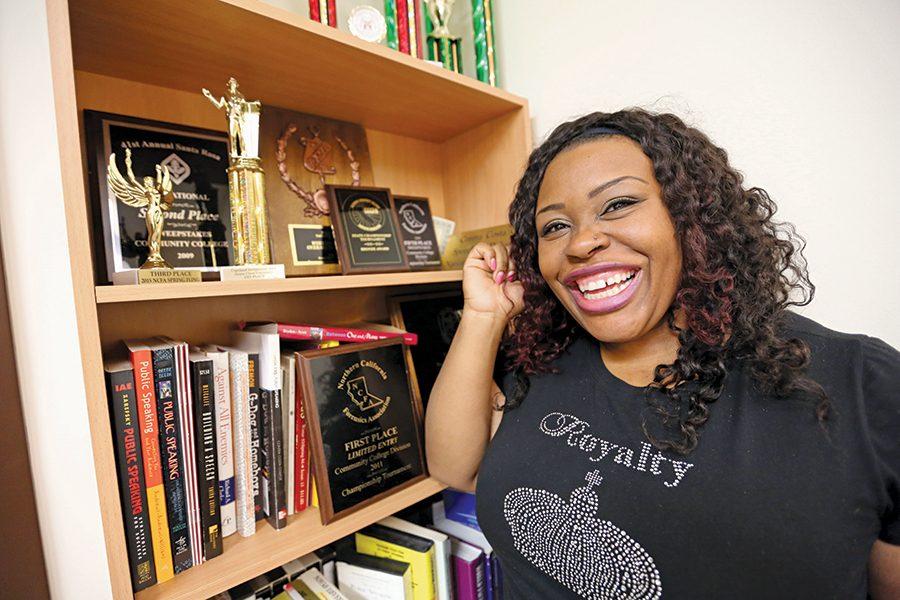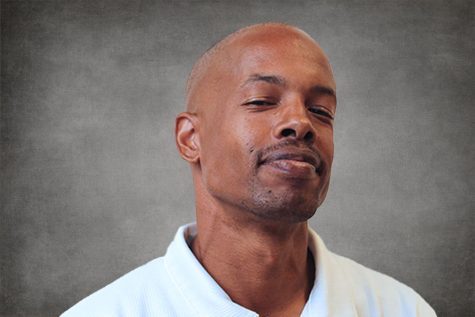Evans-Davis excels in speech
‘Integral part’ earns recognition, bronze medal
Communications major Lerecia Evans-Davis poses next to awards won by the speech department in the AA Building. Evans-Davis is a key asset on the speech and debate team, gaining various accolades at speech tournaments.
May 18, 2016
It’s been said in many ways over the course of decades, but the sentiment behind a quote by analytical psychology founder Carl Jung remains as true as it ever was — “I am not what happened to me. I am what I choose to become.”
For Contra Costa College sophomore Lerecia Evans-Davis, the tribulations that shaped her trajectory would have sent many people spiraling into the depths of despair.
Instead she turned adversity into advantage and took the bronze medal in the California Community College Forensics Association State Championship Tournament held March 9-13 this semester at City College of San Francisco.
It’s been more than five years since CCC has placed in the tournament, which this year featured 33 registered colleges from up and down California.
A career woman, Evans-Davis always saw herself as innovative and creative. She began a career at the Vallejo Times-Herald in 1998 and handled office duties, wrote stories and covered the complete life experience, including birth and death announcements.
She remained on the job until a dip in advertising income hampered the news outlet’s revenue stream.
Combined with the economic crash of 2008, the table was set for Evans-Davis to venture into a career that she always dreamed to be a part of — working with troubled youth.
“I’m about effecting change at the community level,” Evans-Davis said. “When you catch an at-risk teen at the right time you can save its life.”
The married mother of one earned less at her new dream job than she did at her previous position, but her husband’s income made earning less manageable.
Until life threw the young mother a curve ball.
“My husband passed unexpectedly in 2013 and the work that I was doing with the youth wasn’t a viable option any more for a single mother looking to make ends meet,” Evans-Davis said. “I needed to do something to jump-start my career. That’s how I ended up at school.”
A regular performer of spoken word poetry, shortly after enrolling at CCC Evans-Davis met speech department Chairperson Sherry Diestler after performing a persuasive speech at the college’s Intramural Speech Tournament.
Diestler said, “When I first met her she (Evans-Davis) had gotten first place in our tournament. We didn’t know who she was but we asked her to take more courses and she became our star. She’s willing to take on really challenging topics and she also has Programmed Oral Interpretation (POI), so she takes on topics like micro-aggression or giving ‘the talk’ to her son and presents them poetically.”
POI is an 8-10 minute performance of poetry, prose and drama using the works of authors.
Diestler and speech professor Randy Carver impressed Evans-Davis with their passion about the platform to connect with an audience and judges, offered through speech, about real issues that shape culture and everyday life.
“She’s an integral part of the speech department. She holds everyone accountable and is an advocate and recruiter for speech,” team member and communications major Will Jackson said.
After graduating this spring, Evans-Davis ultimately hopes to go back to work with at-risk youth for a non-profit organization.
“Aside from connecting around ideas and applying theories to every day situations, speech holds a lot of merit,” Evans-Davis said. “It has been instrumental in my personal life and academic success.”
Following a run through of her performance on the complications that African-American parents face while educating young sons about going to police officers in case of an emergency, while being completely cognizant of the overarching abuse young black men suffer at the hands of police, the orator was met with a surprising response.
A speech judge from rural Utah approached Evans-Davis and simply said, “That was a very interesting topic. I’ve never looked at the situation like that before.”
“Speech is more than just speaking behind a podium. Public speaking provides a platform to amplify your voice,” Carver said. “The speech department and competitions provide a forum for those amplified voices to be heard.”



